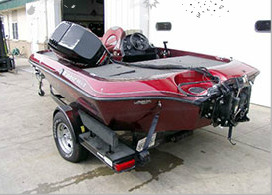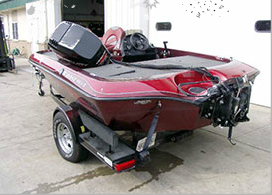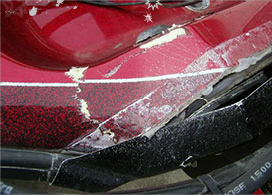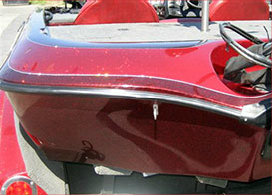Minnesota Boat Repair Minnetonka MN | Collision Boat Repair
Minnesota waterways are some of the most beautiful in the nation. From Lake Minnetonka to the majestic Lake Superior, Minnesota boaters do not lack places to enjoy their sport. And boating is one of the primary reasons people love Minnesota. It ranks among the top stress-relieving activities around. Why? Life is just better on a boat!
When you step onto a boat, you leave the world of deadlines and obligations behind and enter a world of personal time for relaxation. If you truly want to get away from it all, whether you enjoy fishing or just a quiet boat ride, you will find beautiful Minnesota Lakes in every corner of the state. Whether we boat to fish or just to have fun, it’s safe to say that Minnesotans are most content when they are on the water.
In 2008, there were 12,692,892 boats registered in the United States. So many vessels on America’s waterways means that, despite whatever care Minnesota boaters might take, the negligence of other boaters can quickly bring any boating outing to disaster.
Boating Accidents Can Be Costly!
* There are approximately 6,400 recreational boating accidents in the United States each year.
* Collisions account for about 80 percent of all accidents, resulting in nearly 100,000 insurance claims and losses totaling more than $450 million annually.
* In the years 2004 through 2007, more than 2,500 boating accidents resulted from striking a fixed object.
* In those same years, more than 1,400 reported groundings resulted in more than $16 million in damages.
* Groundings are the third-most common reason for assistance calls to TowBoatU.S., behind battery problems and engine failure.
You Are The Captain Of Your Ship
Every Boater has some major responsibilities!
It is imperative that recreational boaters stay alert, prepared, and respectful while you’re out on the lakes this summer. Collisions can be prevented easily if every vessel operator fulfills a few major responsibilities.
Practice good seamanship
It is the responsibility of every boat or PWC operator to take all necessary action to avoid a collision, taking into account the weather, vessel traffic, and limits of other vessels. Such action should be taken in ample time to avoid a collision and at a safe distance from other vessels.
Keep a proper lookout – Pay attention!
Failing to keep a sharp lookout is the most common cause of collisions. Every operator must keep a proper lookout, using both sight and hearing, at all times. Boat operators need to be aware that traffic can exist on the water from all directions. Watch and listen for other vessels, radio communications, navigational hazards, and others involved in water activities.
Collisions with fixed objects, such as sand bars, rocks or other hazards to navigation often result because the operator is unfamiliar with the area, ignores navigation markers, or having out of date charts.
Striking a floating object in the water, such as a log or snag, is usually the consequences of not keeping a good forward lookout at all times.
Another thing your boat comes in contact with every time you use it (other than water) is the dock. Docking can be a boat’s worst nemesis. Chips, dock rash, and other damage can occur during the docking process.
Maintain a safe speed – Slow down!
Safe speed is the speed that ensures you will have ample time to avoid a collision and can stop within an appropriate distance. Safe speed will vary depending on conditions such as wind, water conditions, navigational hazards, visibility, surrounding vessel traffic density, and the maneuverability of your boat or PWC. Always reduce speed and navigate with extreme caution at night and when visibility is restricted.
Exceptions to the Navigation Rules
The rules that follow cover most of the situations you will encounter as a recreational boater. However, be aware that there are exceptions to the rules. For example if, you approach a vessel that has less maneuverability than your vessel, the other vessel will usually be the stand-on vessel.
Remember …
The Golden Rule of Boating is safety first to insure happy days afloat! A great day on the water can turn into a bad day in the blink of an eye.
Every operator is responsible for avoiding a collision at all cost, even if it means breaking every rule in the book! In complying with the navigation rules, operators must consider all dangers of navigation; risk of collisions; and any special conditions, including the limitations of the boats involved. These considerations may make a departure from the navigation rules necessary to avoid immediate danger.
Boats are bigger and faster than ever. Just because your watercraft can go 70-plus mph doesn’t mean it should be operated that fast. You need to be traveling at slow enough speed where you can stop or maneuver in time to avoid other boats, rocks, logs, or other hazards in your path.
Fiberglass, Aluminum Or Metal Flake Boat Repair
Whether it’s your new aluminum fishing boat, your prized fiberglass speed boat or the shiny metal flake paint job on your new Ranger boat, any of those things can do some serious damage.
Whether you are new to the boating or have spent the majority of your life on the water, it is important to know some basic boat handling skills. These skills will allow you to maneuver your boat in any type of unforeseen situation that comes up, (and it will!), so you’ll be able to get out on the water, have fun, and do the one thing your boat is supposed to do… Make you SMILE!!!





